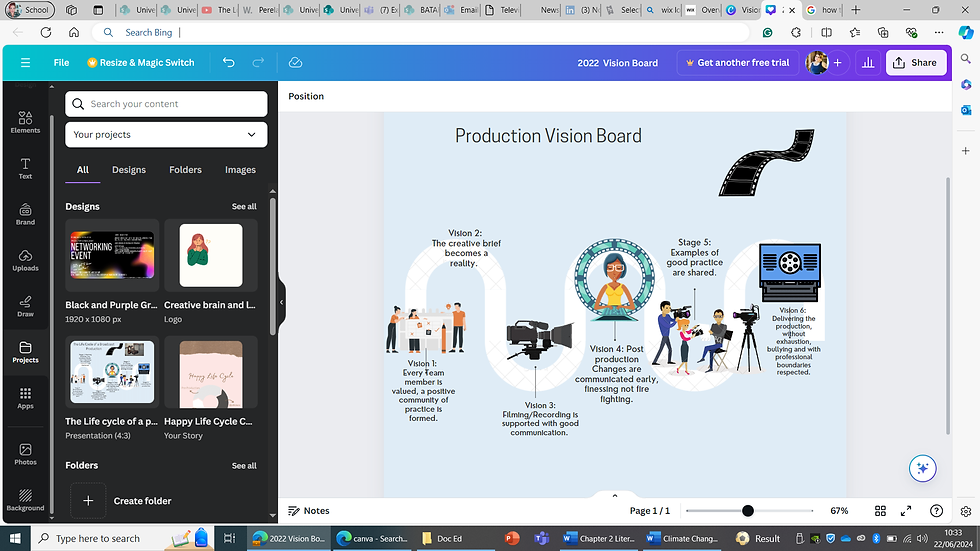How Production Managers Can Help Save the World!
- Perelandra Beedles
- Mar 10, 2024
- 3 min read

It's always great to see the arrival of spring after a long winter. The days are getting longer, the weather is getting warmer, and the plants are starting to bloom. It's a reminder of the importance of protecting nature and its biodiversity, a topic which has been much in the news recently as the sixth UN Environment Assembly (UNEA-6) concluded this month. With over 5,600 participants from 190 countries taking part in the week-long assembly held at the UN Environment Programme (UNEP) headquarters in Kenya, the Assembly focused on multilateral actions to tackle climate change, biodiversity loss, and pollution. As a result, 15 resolutions were created to boost efforts to address these pressing issues. There's much to do, and an increasing sense of urgency to act.

Image Copyright RTS
How apt then that I have spent the last few weeks training film and television production management students on the part they can play in this climate emergency helping them gain BAFTA Albert accreditation. Created to help the film and TV industry reduce its carbon footprint and become more sustainable, the training program, provides practical tools, resources, and guidelines to support sustainable production practices and covers various aspects of sustainability, including energy and resource efficiency, waste reduction, responsible sourcing, and biodiversity conservation.
As one of the earliest adopters of this initiative (I was one of the first BAFTA Albert Higher Education Accredited trainers), it has been wonderful to see knowledge and awareness grow about the steps we can take to mitigate the pollution caused by the screen industries.
You may think a short course on climate change might be down beat, full of sad polar bears on melting ice caps and doom laden graphs telling us the end is nigh and while there is a bit of that, it is actually a wonderfully life-affirming course which empowers all who take it-yes we have a problem but good news, we also have the solution, and you know how us PMs love solutions.
The course includes lectures, workshops, and the use of the BAFTA Albert Carbon Calculator, an online tool that helps productions measure and reduce their carbon footprint. By inputting data on various aspects of production, such as travel and energy use, the calculator provides recommendations on how to reduce emissions and improve sustainability. Completing the training earns students a BAFTA Albert certificate (and who doesn’t love a certificate), demonstrating their commitment to sustainability and setting them apart in a competitive industry. As an approach, it is a true best practice, enabling productions to reduce their environmental impact, save money, and inspire positive social change. As a Production manager, I love any action that provides multiple good results, and this is by far one of the best examples.
One of the wonderful case studies I show my students when delivering the BAFTA Albert training is "1917," a war film directed by Sam Mendes. The unique aspect of the film is that it is shot to appear as a single continuous take, which makes the audience feel as if they are following the soldiers in real-time. a technique which gives the audience a sense of urgency and immerses them in the story.
The film received critical acclaim for its cinematography, direction, and performances by the cast, but what made it so special for me was that it was the first feature film to receive BAFTA Albert accreditation and by the end of filming 1917’s actions to reduce its waste and carbon footprint meant that the production achieved a three-star certification from Albert. There were so many clever ways they achieved this, but my favourites included:
· running generators on waste vegetable oil
· compostable plates and cutlery
· Repurposing many of the prop corpses, in Neal Street’s TV series Britannia! (talk about pre-loved)
"1917" is a beautifully crafted film that tells a compelling and emotional story of heroism and sacrifice during one of the most significant conflicts in history and we too are in a significant period. As Production Managers, our weapons may not be tanks or guns but instead are agile thinking and creative problem solving, and we must protect our land (environment) and our troops (crew) just as fiercely as the soldiers portrayed in Mendes’s film.
At a time when production budgets are getting tighter, I worry that activities supporting diversity, sustainability and equity risk being mothballed, and as the headlines of UNEA-6 make clear, it would be the worst kind of false economy. The BAFTA Albert training program is an important step towards making the film and television industry more sustainable and helping to preserve the environment for future generations. As I witness my students fully embracing the principles behind it, I do feel some hope, spring is coming.





Comments